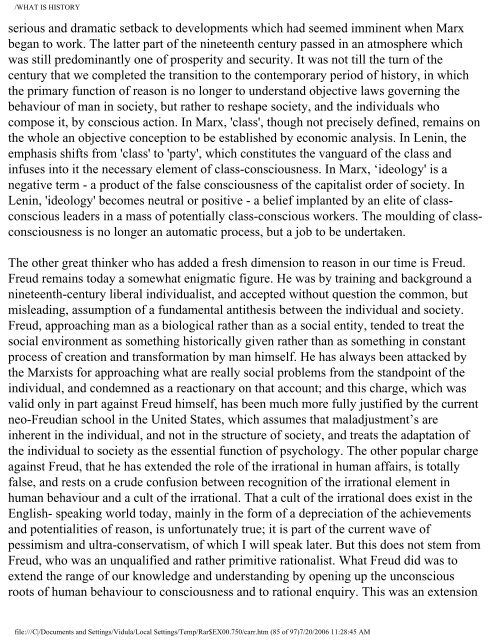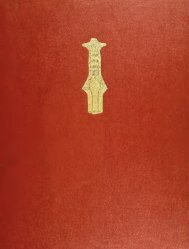What is History / by Edward Hallett Carr - Universal History Library
What is History / by Edward Hallett Carr - Universal History Library
What is History / by Edward Hallett Carr - Universal History Library
You also want an ePaper? Increase the reach of your titles
YUMPU automatically turns print PDFs into web optimized ePapers that Google loves.
WHAT IS HISTORY<br />
serious and dramatic setback to developments which had seemed imminent when Marx<br />
began to work. The latter part of the nineteenth century passed in an atmosphere which<br />
was still predominantly one of prosperity and security. It was not till the turn of the<br />
century that we completed the transition to the contemporary period of h<strong>is</strong>tory, in which<br />
the primary function of reason <strong>is</strong> no longer to understand objective laws governing the<br />
behaviour of man in society, but rather to reshape society, and the individuals who<br />
compose it, <strong>by</strong> conscious action. In Marx, 'class', though not prec<strong>is</strong>ely defined, remains on<br />
the whole an objective conception to be establ<strong>is</strong>hed <strong>by</strong> economic analys<strong>is</strong>. In Lenin, the<br />
emphas<strong>is</strong> shifts from 'class' to 'party', which constitutes the vanguard of the class and<br />
infuses into it the necessary element of class-consciousness. In Marx, ‘ideology' <strong>is</strong> a<br />
negative term - a product of the false consciousness of the capital<strong>is</strong>t order of society. In<br />
Lenin, 'ideology' becomes neutral or positive - a belief implanted <strong>by</strong> an elite of classconscious<br />
leaders in a mass of potentially class-conscious workers. The moulding of classconsciousness<br />
<strong>is</strong> no longer an automatic process, but a job to be undertaken.<br />
The other great thinker who has added a fresh dimension to reason in our time <strong>is</strong> Freud.<br />
Freud remains today a somewhat enigmatic figure. He was <strong>by</strong> training and background a<br />
nineteenth-century liberal individual<strong>is</strong>t, and accepted without question the common, but<br />
m<strong>is</strong>leading, assumption of a fundamental antithes<strong>is</strong> between the individual and society.<br />
Freud, approaching man as a biological rather than as a social entity, tended to treat the<br />
social environment as something h<strong>is</strong>torically given rather than as something in constant<br />
process of creation and transformation <strong>by</strong> man himself. He has always been attacked <strong>by</strong><br />
the Marx<strong>is</strong>ts for approaching what are really social problems from the standpoint of the<br />
individual, and condemned as a reactionary on that account; and th<strong>is</strong> charge, which was<br />
valid only in part against Freud himself, has been much more fully justified <strong>by</strong> the current<br />
neo-Freudian school in the United States, which assumes that maladjustment’s are<br />
inherent in the individual, and not in the structure of society, and treats the adaptation of<br />
the individual to society as the essential function of psychology. The other popular charge<br />
against Freud, that he has extended the role of the irrational in human affairs, <strong>is</strong> totally<br />
false, and rests on a crude confusion between recognition of the irrational element in<br />
human behaviour and a cult of the irrational. That a cult of the irrational does ex<strong>is</strong>t in the<br />
Engl<strong>is</strong>h- speaking world today, mainly in the form of a depreciation of the achievements<br />
and potentialities of reason, <strong>is</strong> unfortunately true; it <strong>is</strong> part of the current wave of<br />
pessim<strong>is</strong>m and ultra-conservat<strong>is</strong>m, of which I will speak later. But th<strong>is</strong> does not stem from<br />
Freud, who was an unqualified and rather primitive rational<strong>is</strong>t. <strong>What</strong> Freud did was to<br />
extend the range of our knowledge and understanding <strong>by</strong> opening up the unconscious<br />
roots of human behaviour to consciousness and to rational enquiry. Th<strong>is</strong> was an extension<br />
file:///C|/Documents and Settings/Vidula/Local Settings/Temp/Rar$EX00.750/carr.htm (85 of 97)7/20/2006 11:28:45 AM







